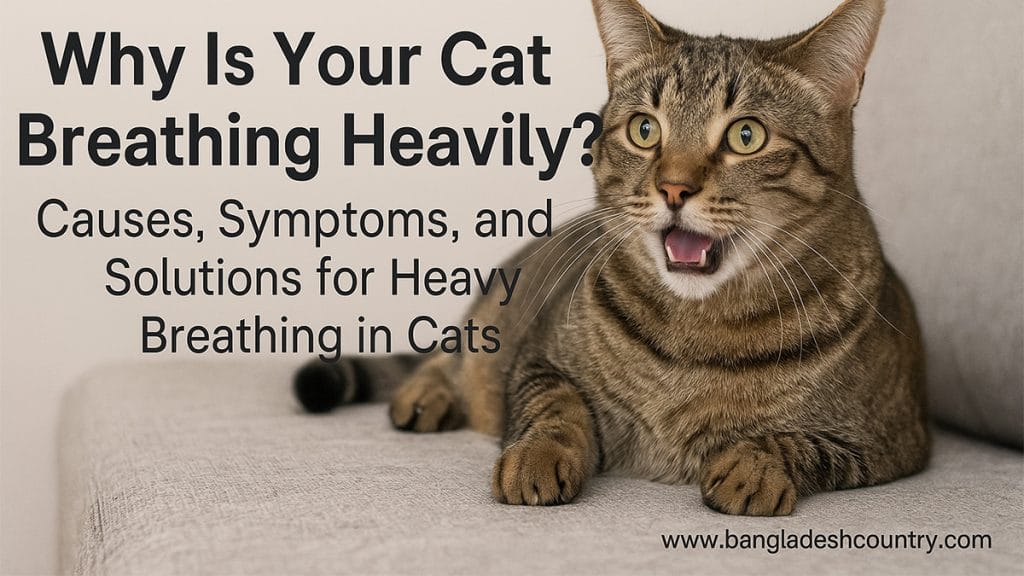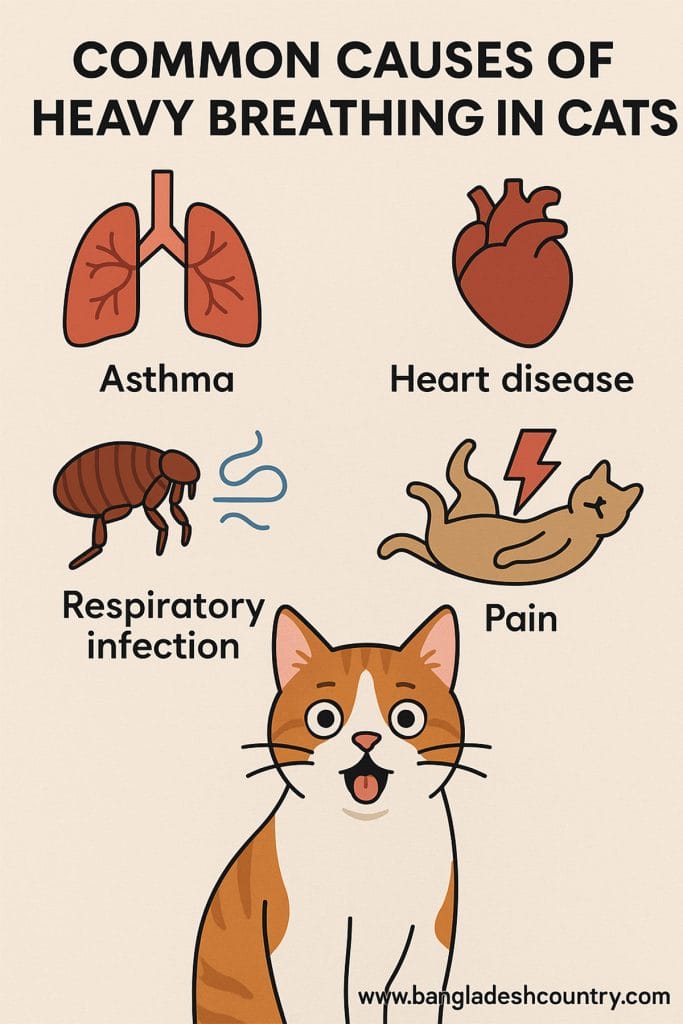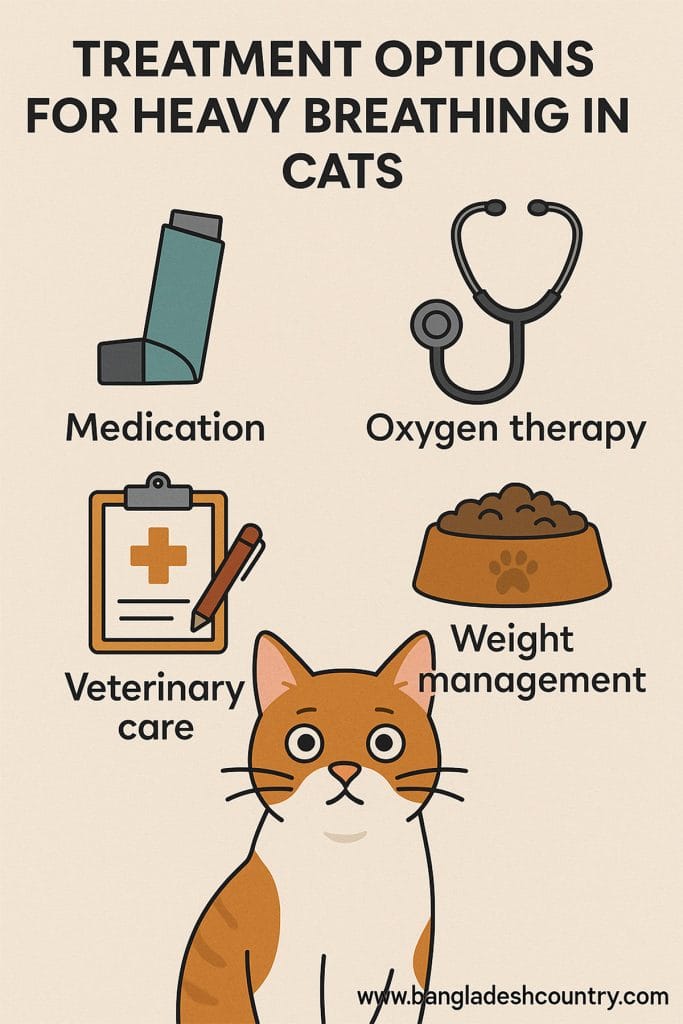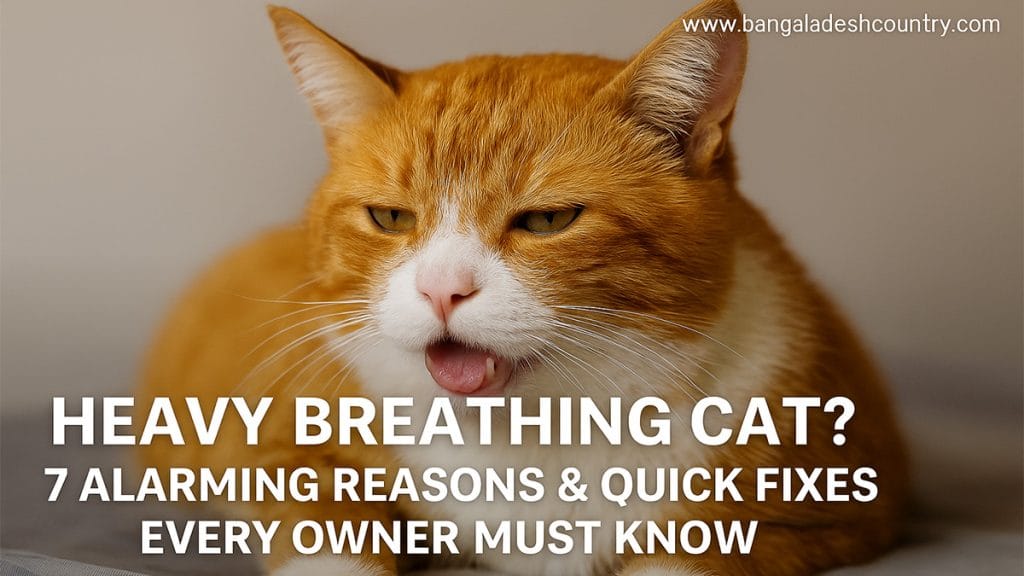Introduction
Seeing your cat breathing heavy can be alarming—especially if it’s happening while they’re resting or not playing. A heavy breathing cat may show signs like rapid chest movement, shallow breaths, open-mouth breathing, or even unusual noises. While occasional panting in cats can be caused by heat, stress, or excitement, persistent or labored breathing often indicates a more serious health issue.
Unlike dogs, cats rarely breathe heavily unless something is wrong. Whether your cat breathes heavy when sleeping, after light activity, or while completely still, it’s crucial to understand the difference between normal behavior and a potential emergency. In some cases, a heavy breathing cat could be experiencing asthma, heart conditions, infections, or even obesity.
Many cat owners ask, “Why is my cat breathing heavy all of a sudden?” or “Is my cat just overheated or is it something serious?” If you’ve spotted signs like your heavy breathing cat refusing food, appearing lethargic, or breathing with their mouth open, it’s time to take action.
This article will walk you through the possible causes of a heavy breathing cat, symptoms to watch out for, how vets diagnose these issues, and what you can do to help your cat breathe easy again. If you love cats and want to learn more about choosing the right breed for your family, don’t miss our guide: 5 Amazing Birman Cat for Sale Tips You’ll Love.

Why Is My Cat Breathing Heavy?
If you’ve found yourself wondering, “Why is my cat breathing heavy?”, you’re not alone. A heavy breathing cat—also known as dyspnea—can occur for various reasons, and understanding the context is the first step toward addressing the problem.
Cat Breathing Heavy While Resting or Sleeping
It’s not normal for a cat to breathe heavy while sleeping. If you notice your cat’s sides rising and falling rapidly or they seem to be working harder to breathe, this could signal a hidden health concern. While a relaxed cat breathes slowly and evenly, any noticeable effort while at rest—especially if your cat breathes heavy when sleeping—should be investigated. This is one of the earliest warning signs of a heavy breathing cat that shouldn’t be ignored.
If you’re thinking about adopting a calm, affectionate breed that loves to relax with you, check out our article on the Birman cat: 5 Amazing Birman Cat for Sale Tips You’ll Love.
Cat Breathing Heavy After Playing
After a burst of activity, it’s possible to see your heavy breathing cat struggling to catch their breath, particularly if they’re overweight or out of shape. However, this should be short-lived. If the heavy breathing continues for several minutes, or if your cat seems lethargic after activity, it might indicate underlying heart or respiratory issues.
Cat Breathing Heavy With Mouth Open
Cats don’t typically breathe with their mouth open like dogs. If your heavy breathing cat is panting, gasping, or breathing with its mouth open, this is often a sign of respiratory distress. Causes may range from asthma and infections to more serious problems like fluid buildup in the lungs or airway obstruction. A cat panting or breathing heavy with tongue out is always a red flag.
Cat Breathing Heavy But Acting Normal
Sometimes, your cat may seem to be breathing heavy but still acting normal—playing, eating, and grooming. While this may appear less alarming, it could be a subtle sign of chronic respiratory or cardiac stress. A heavy breathing cat with normal activity might be experiencing hidden conditions like hypertrophic cardiomyopathy, which often develop quietly before becoming critical.
Older Cat Breathing Heavy
If your old cat is breathing heavy, the cause may be age-related degeneration of the heart, lungs, or immune system. Aging cats are more prone to chronic illnesses that affect breathing, and their bodies may no longer compensate as effectively during periods of stress or illness. Older cats breathing heavy may require more frequent monitoring and immediate attention.
In summary, while a heavy breathing cat can sometimes recover quickly if it’s caused by stress or exertion, consistent or unexplained breathing changes should never be ignored. A cat breathing heavy and not eating, resting too much, or hiding may be in pain or discomfort—and professional veterinary attention is often necessary.
Common Causes of Heavy Breathing in Cats
A heavy breathing cat can be experiencing anything from mild irritation to a life-threatening medical emergency. Understanding the root causes helps you act faster—and potentially save your pet’s life.
1. Respiratory Problems
One of the most frequent reasons behind a heavy breathing cat is a respiratory issue.
- Feline Asthma: Inflammatory airway disease can cause wheezing, coughing, and labored breathing. If your cat breathes heavy through the nose or makes a whistling sound, asthma could be the culprit.
- Upper Respiratory Infections (URIs): Bacterial or viral infections like feline herpesvirus can cause congestion, sneezing, and heavy breathing in cats.
- Pneumonia or Lung Inflammation: This can make your cat breathe fast and shallow, often leading to cat breathing heavy while resting or sleeping. A heavy breathing cat with pneumonia may also display fever and weakness.
2. Heart Disease
Cardiac conditions are another major cause of a heavy breathing cat.
- Hypertrophic Cardiomyopathy (HCM): This thickens the heart muscles and reduces its efficiency, causing fluid buildup in the lungs and difficulty breathing.
- Congestive Heart Failure: If your cat is breathing heavy and lethargic, it could be due to the heart’s inability to circulate blood properly, leading to fluid accumulation in the lungs.
Cats with heart disease may also experience heavy breathing while sleeping, especially in a crouched or extended neck position to try to get more air.
3. Stress and Anxiety
Cats are extremely sensitive animals. Loud noises, new environments, or sudden routine changes can cause a heavy breathing cat to appear distressed.
- Cat breathing heavy when purring may seem normal, but if the breath is fast and shallow, it could be due to anxiety or discomfort.
- Cat breathing heavy in the car is another common scenario caused by travel stress.
While this type of breathing often resolves once your cat calms down, persistent symptoms should still be checked by a vet.
4. Obesity and Lack of Exercise
An overweight or fat cat breathing heavy is sadly very common. Extra body fat puts pressure on the lungs and heart, especially during any form of activity. Maintaining a healthy weight is critical for all breeds. For tips on choosing a breed known for its gentle nature and manageable activity needs, see: 5 Amazing Birman Cat for Sale Tips You’ll Love.
- You may notice your heavy breathing cat struggling after playing, even for a short time.
- In more severe cases, a cat breathing heavy and not eating or moving could be suffering from obesity-related complications like high blood pressure or joint pain.
Helping your cat maintain a healthy weight is one of the most effective long-term strategies to reduce breathing issues.
5. Other Triggers & Medical Conditions
- Allergies or environmental irritants (dust, smoke, air fresheners)
- Heatstroke or overheating
- Post-surgery recovery, e.g., cat breathing heavy after anesthesia or spay
- Parasites like heartworms
- Foreign object lodged in the throat or nose
Always monitor for combinations like cat heavy breathing and coughing, cat breathing heavy and drooling, or heavy breathing with weird noises—these can offer vital clues about what’s wrong.
Common Causes of Heavy Breathing in Cats

A heavy breathing cat can be experiencing anything from mild irritation to a life-threatening medical emergency. Understanding the root causes helps you act faster—and potentially save your pet’s life.
1. Respiratory Problems
One of the most frequent reasons behind cat heavy breathing is a respiratory issue.
- Feline Asthma: Inflammatory airway disease can cause wheezing, coughing, and labored breathing. If your cat breathes heavy through the nose or makes a whistling sound, asthma could be the culprit.
- Upper Respiratory Infections (URIs): Bacterial or viral infections like feline herpesvirus can cause congestion, sneezing, and heavy breathing in cats.
- Pneumonia or Lung Inflammation: This can make your cat breathe fast and shallow, often leading to cat breathing heavy while resting or sleeping.
2. Heart Disease
Cardiac conditions are another major cause of cats breathing heavy.
- Hypertrophic Cardiomyopathy (HCM): This thickens the heart muscles and reduces its efficiency, causing fluid buildup in the lungs and difficulty breathing.
- Congestive Heart Failure: If your cat is breathing heavy and lethargic, it could be due to the heart’s inability to circulate blood properly, leading to fluid accumulation in the lungs.
Cats with heart disease may also experience cat breathing heavy while sleeping, especially in a crouched or extended neck position to try to get more air.
3. Stress and Anxiety
Heavy Breathing Cat are extremely sensitive animals. Loud noises, new environments, or sudden routine changes can cause a cat to breathe heavy out of fear or stress.
- Cat breathing heavy when purring may seem normal, but if the breath is fast and shallow, it could be due to anxiety or discomfort.
- Cat breathing heavy in the car is another common scenario caused by travel stress.
While this type of breathing often resolves once your cat calms down, persistent symptoms should still be checked by a vet.
4. Obesity and Lack of Exercise
Heavy Breathing Cat, An overweight or fat cat breathing heavy is sadly very common. Extra body fat puts pressure on the lungs and heart, especially during any form of activity.
- You may notice cat breathing heavy after playing, even for a short time.
- In more severe cases, a cat breathing heavy and not eating or moving could be suffering from obesity-related complications like high blood pressure or joint pain.
Helping your cat maintain a healthy weight is one of the most effective long-term strategies to reduce breathing issues.
5. Other Triggers & Medical Conditions
- Allergies or environmental irritants (dust, smoke, air fresheners)
- Heatstroke or overheating
- Post-surgery recovery, e.g., cat breathing heavy after anesthesia or spay
- Parasites like heartworms
- Foreign object lodged in the throat or nose
Always monitor for combinations like cat heavy breathing and coughing, cat breathing heavy and drooling, or heavy breathing with weird noises—these can offer vital clues about what’s wrong.
Urgent Signs to Watch For
Not all heavy breathing in cats is immediately life-threatening—but certain symptoms require emergency veterinary attention. If you notice any of the following warning signs in your heavy breathing cat, don’t delay seeking professional help.
Cat Breathing Heavy and Not Eating
If your cat is breathing heavy and not eating, it’s a strong indication of distress. Loss of appetite combined with labored breathing often signals underlying issues like infection, heart failure, or organ dysfunction. When paired with lethargy or hiding behavior, it’s time for an urgent vet visit.
Cat Breathing Heavy With Mouth Open
Heavy Breathing Cat, Unlike dogs, cats rarely breathe with their mouths open. So, if you catch your cat breathing heavy with mouth open, this is typically a sign of respiratory crisis. Especially if the cat’s tongue is out, or they appear to be gasping, they may be trying to compensate for oxygen shortage.
Cat Breathing Heavy While Sleeping or Resting
A cat breathing heavy while sleeping is never normal. Their chest may rise and fall rapidly, or they might snore or make wheezing noises. If your cat breathes heavy at rest, even when calm and still, it could point to fluid in the lungs, asthma, or a failing heart.
Blue or Pale Gums and Tongue
Cyanosis—or the blue discoloration of the gums or tongue—is a critical sign of oxygen deprivation. If you notice this along with labored breathing, call your vet or rush to an emergency animal clinic. This usually indicates that oxygen isn’t reaching vital organs.
Cat Breathing Heavy and Lethargic
If your cat is breathing heavy and seems lethargic, unable to walk or reluctant to move, this is a red flag. It may be the result of severe infection, toxin exposure, or heart disease. Also watch for signs like drooling, uncoordinated movements, or trembling.
Additional Alarming Combinations
- Cat breathing heavy and coughing
- Cat breathing heavy and meowing in distress
- Cat breathing heavy and not moving for a long time
- Cat breathing heavy with stomach visibly rising
- Cat breathing heavy after throwing up or surgery
These combinations could indicate a worsening health condition and should not be ignored.
How Vets Diagnose Heavy Breathing in Cats
When you bring in your heavy breathing cat to the vet, the first priority is to determine what’s causing the abnormal breathing pattern. Cats often hide symptoms until their condition is advanced, so a prompt and thorough diagnostic process is essential.
1. Physical Examination
Your vet will begin with a hands-on physical exam. They’ll observe your cat’s breathing rate, posture, and chest movement. Listening through a stethoscope helps detect abnormal lung sounds, heart murmurs, or airway obstructions. If your cat breathes heavy through the nose, they may also check for nasal blockages or swelling.
The vet will ask important questions like:
- When did the heavy breathing start?
- Is your cat eating, playing, or behaving normally?
- Has your cat been exposed to any toxins, allergens, or stress?
These insights help narrow down potential causes quickly.
2. Imaging: X-rays and Ultrasound
X-rays (radiographs) are one of the most effective tools for spotting internal problems in a cat breathing heavy. Chest X-rays can show:
- Lung inflammation or fluid buildup
- Enlarged heart or congested vessels
- Tumors or foreign objects in the airway
If heart disease is suspected, the vet may recommend an ultrasound (echocardiogram). This provides a real-time view of the heart’s chambers, valves, and overall function—vital for diagnosing conditions like hypertrophic cardiomyopathy or heart failure.
3. Blood Tests and Oxygen Levels
Bloodwork helps assess your cat’s organ function, detect infections, or uncover conditions like anemia that may contribute to breathing issues. A complete blood count (CBC) and biochemistry profile can reveal important markers of health and inflammation.
Pulse oximetry or arterial blood gas analysis may also be used to determine your cat’s oxygen saturation. If the oxygen level is low, the vet will act fast to stabilize your cat and identify the reason behind the drop.
4. Additional Diagnostic Methods
Depending on the situation, your vet may also suggest:
- Urinalysis: To check for infection, dehydration, or toxins
- Bronchoscopy: To examine the airways if obstruction or mass is suspected
- FIV/FeLV tests: To rule out viral causes of chronic illness
- Heartworm test: If parasites are suspected in a cat breathing heavy and coughing
By combining these tests, vets can get a full picture of what’s going on internally and recommend the appropriate treatment.
Treatment Options for Cat Heavy Breathing

Once the underlying cause of your heavy breathing cat has been identified, the next step is treatment. Depending on the diagnosis, treatments may range from medication to emergency care, or even lifestyle changes for long-term management.
1. Medications for Respiratory Conditions
If your cat’s breathing trouble stems from asthma, infections, or inflammation, your vet may prescribe:
- Steroids (e.g., Prednisolone): To reduce airway inflammation, especially in cats with asthma.
- Bronchodilators (e.g., Albuterol): Help open up the airways and make breathing easier.
- Antibiotics: Used when your cat breathing heavy and coughing is caused by bacterial infections like pneumonia or bronchitis.
For cats breathing heavy due to allergic reactions, antihistamines may be given to control triggers like dust or pollen.
2. Medications for Heart Disease
If the cat heavy breathing is caused by heart issues such as hypertrophic cardiomyopathy or congestive heart failure, treatment may include:
- Diuretics (e.g., Furosemide): To remove excess fluid from the lungs.
- ACE inhibitors: Help relax blood vessels and reduce the heart’s workload.
- Beta-blockers or calcium channel blockers: To manage heart rhythm and function.
These medications can improve breathing, reduce fatigue, and help prevent your cat from breathing heavy and lethargic again.
3. Emergency Care and Hospitalization
For severe cases—like when your cat is breathing heavy and not eating, drooling, or shaking—immediate veterinary intervention is necessary. Emergency treatment may involve:
- Oxygen therapy: Administered through a mask or oxygen cage.
- Fluid drainage: If fluid has built up in the chest cavity or around the lungs.
- Surgical procedures: In rare cases, surgery may be needed to remove tumors, correct heart defects, or address airway obstructions.
Prompt emergency care can stabilize your cat’s condition and prevent fatal complications.
4. Lifestyle Changes and Home Care
For long-term health and prevention of recurring episodes, lifestyle adjustments are critical:
- Weight management: Overweight or fat cats breathing heavy benefit significantly from controlled diets and increased activity.
- Environmental control: Reduce exposure to allergens, cigarette smoke, or strong fragrances.
- Stress reduction: Use calming diffusers, maintain a consistent routine, and provide quiet resting areas.
These steps can be especially helpful if your cat breathes heavy when stressed, overheated, or after minor exertion.
Preventing Heavy Breathing in Cats
While some causes of a heavy breathing cat are unpredictable, many can be minimized—or even avoided—through proactive care. Prevention not only protects your cat’s lungs and heart but also reduces costly vet visits and improves their overall well-being.
1. Schedule Regular Vet Checkups
Routine veterinary visits are your first line of defense. A checkup every 6 to 12 months allows your vet to detect early signs of issues like asthma, heart disease, or respiratory infections—often before symptoms like cat breathing heavy at rest even appear. Early intervention can prevent minor issues from becoming life-threatening.
2. Maintain a Healthy Weight
Overweight cats are more likely to experience labored breathing due to excess fat pressing against their lungs and heart.
- If you have a fat cat with heavy breathing, consult your vet to create a balanced diet plan.
- Encourage light exercise like climbing, playtime, or interactive toys.
Shedding just a little weight can significantly reduce pressure on the respiratory system and improve your cat’s breathing while sleeping or playing.
3. Control Environmental Triggers
Many cats have sensitivities to environmental factors that cause them to breathe heavy suddenly. These include:
- Dust, mold, pollen
- Cigarette smoke or air fresheners
- Strong cleaning chemicals
Use HEPA filters, ventilate your home, and avoid scented sprays to create a cat-friendly, low-irritant environment.
4. Minimize Stress and Anxiety
Stress can trigger cat breathing heavy when sleeping or resting—especially if they’ve been exposed to loud noises, guests, or travel.
To reduce stress:
- Provide safe, quiet spaces for hiding
- Use feline pheromone diffusers
- Keep routines consistent (feeding, playtime, sleeping)
Cats that feel safe are less likely to develop stress-induced breathing issues.
5. Hydration and Clean Air
Keep fresh water available at all times, as dehydration can make breathing harder. If you live in a dry climate, consider a humidifier to keep airways moist and easier to breathe through—especially helpful if your cat breathes heavy through the nose.
Conclusion
If you’ve noticed your cat breathing heavy, especially without any clear reason like playing or overheating, it’s time to take that sign seriously. Cats are naturally quiet and discreet when it comes to illness, so even subtle changes—like heavy breathing while resting, panting with mouth open, or appearing lethargic and withdrawn—can be early indicators of a larger problem.
Whether the issue is caused by asthma, heart disease, stress, obesity, or infection, understanding why your cat is breathing heavy is the first step toward providing relief. Quick diagnosis and proper treatment can dramatically improve your cat’s quality of life—and in some cases, even save it.
Prevention plays a vital role too. With regular vet visits, a healthy diet, weight management, and a stress-free environment, you can greatly reduce the risk of future episodes in your cat.
Final Tip: If your cat breathes heavy when sleeping, refuses to eat, or shows signs of discomfort, don’t wait. Contact your veterinarian as soon as possible. It’s always better to be safe than sorry when it comes to your furry companion’s health.
Your cat depends on you—not just for love and food, but for early recognition of these vital health signals. Your vet can help identify the cause and provide the necessary treatment, ensuring your furry friend stays happy and healthy for years to come. Choosing the right breed can also help prevent many health issues in the long run. Learn more about the gentle, beautiful Birman cat here: 5 Amazing Birman Cat for Sale Tips You’ll Love.
Frequently Asked Questions (FAQ) About Heavy Breathing Cat
Is it normal for a cat to breathe heavily after playing?
Short heavy breathing post-play is okay, but if it lasts long or your cat seems tired, see a vet.
Why is my cat breathing heavy while resting or sleeping?
Heavy breathing at rest may signal asthma, heart issues, or lung fluid. It’s not normal—contact your vet.
Should I worry if my cat is breathing through its mouth?
Yes. Open-mouth breathing in cats is a red flag and may mean distress. Seek urgent vet care.
What does it mean if my cat is breathing heavy but still acting normal?
It could be early signs of hidden illness like heart disease. Don’t ignore—get a vet checkup.
Can stress or anxiety cause heavy breathing in cats?
Yes, but it should stop when calm. If it doesn’t, there might be an underlying issue.
Is heavy breathing common in older cats?
Older cats may breathe heavy due to heart or lung problems. Vet checks are important.
When is heavy breathing a veterinary emergency?
If it includes open-mouth panting, blue gums, or lethargy—get emergency vet help immediately.



